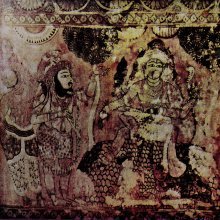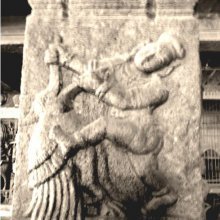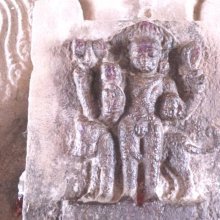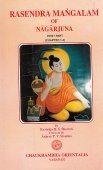Hi, Hī: 14 definitions
Introduction:
Hi means something in Hinduism, Sanskrit, the history of ancient India, Marathi, Jainism, Prakrit, Hindi, Tamil. If you want to know the exact meaning, history, etymology or English translation of this term then check out the descriptions on this page. Add your comment or reference to a book if you want to contribute to this summary article.
Alternative spellings of this word include Hee.
Images (photo gallery)
(+192 more images available)
In Hinduism
Vyakarana (Sanskrit grammar)
Source: Wikisource: A dictionary of Sanskrit grammar1) Hi (हि).—Personal-ending of the second pers. sing. substituted for सि (si) in the imperative mood; cf. सेर्ह्यपिच्च (serhyapicca) P. III. 4.87;
2) Hi.—A sign-word used in the Vajasaneyi-pratisakhya to mark the termination of the words of the Adhikarasutra V. Pr.III.5, IV.11.

Vyakarana (व्याकरण, vyākaraṇa) refers to Sanskrit grammar and represents one of the six additional sciences (vedanga) to be studied along with the Vedas. Vyakarana concerns itself with the rules of Sanskrit grammar and linguistic analysis in order to establish the correct context of words and sentences.
India history and geography
Source: Cologne Digital Sanskrit Dictionaries: Indian Epigraphical GlossaryHi.—(IE 8-1), abbreviation of hiraṇya, ‘cash’ or ‘revenue income in cash’. Cf. sāṃ-hi. Note: hi is defined in the “Indian epigraphical glossary” as it can be found on ancient inscriptions commonly written in Sanskrit, Prakrit or Dravidian languages.

The history of India traces the identification of countries, villages, towns and other regions of India, as well as mythology, zoology, royal dynasties, rulers, tribes, local festivities and traditions and regional languages. Ancient India enjoyed religious freedom and encourages the path of Dharma, a concept common to Buddhism, Hinduism, and Jainism.
Languages of India and abroad
Marathi-English dictionary
Source: DDSA: The Molesworth Marathi and English Dictionaryhī (ही).—ad Also, likewise, additionally. 2 Even.
Source: DDSA: The Aryabhusan school dictionary, Marathi-Englishhī (ही).—ad Also, likewise. Even.
Marathi is an Indo-European language having over 70 million native speakers people in (predominantly) Maharashtra India. Marathi, like many other Indo-Aryan languages, evolved from early forms of Prakrit, which itself is a subset of Sanskrit, one of the most ancient languages of the world.
Sanskrit dictionary
Source: DDSA: The practical Sanskrit-English dictionaryHi (हि).—ind. (Never used at the beginning of a sentence) It has the following senses:-
1) For, because (expressing a strict or logical reason); अग्निरिहास्ति धूमो हि दृश्यते (agnirihāsti dhūmo hi dṛśyate) G. M.; R.5.1.
2) Indeed, surely; देव प्रयोगप्रधानं हि नाठ्यशास्त्रम् (deva prayogapradhānaṃ hi nāṭhyaśāstram) M.1; न हि कमलिनीं दृष्ट्वा ग्राहमवेक्षते मतङ्गजः (na hi kamalinīṃ dṛṣṭvā grāhamavekṣate mataṅgajaḥ) M. 3.
3) For instance, as is well known; प्रजानामेव भूत्यर्थ स ताभ्यो बलिमग्रहीत् । सहस्रगुणमुत्स्रष्टुमादत्ते हि रसं रविः (prajānāmeva bhūtyartha sa tābhyo balimagrahīt | sahasraguṇamutsraṣṭumādatte hi rasaṃ raviḥ) R.1.18.
4) Only, alone (to emphasize an idea); मूढो हि मदनेना- यास्यते (mūḍho hi madanenā- yāsyate) K.155.
5) Sometimes it is used merely as an expletive.
--- OR ---
Hi (हि).—5 P. (hinoti, hita; caus. hāyayati; desid. jighīṣati)
1) To send forth, impel.
2) To cast, throw, discharge, shoot; गदा शक्रजिता जिध्ये (gadā śakrajitā jidhye) Bhaṭṭikāvya 14.36.
3) To excite, incite, urge.
4) To promote, further.
5) To gratify, please, exhilarate.
6) To go or proceed.
7) To forsake, abandon; सर्वेषु भूतेष्वधियज्ञमीशं यजस्व योगेन च कर्म हिन्वन् (sarveṣu bhūteṣvadhiyajñamīśaṃ yajasva yogena ca karma hinvan) Bhāgavata 7.1.12.
--- OR ---
Hī (ही).—ind. An interjection of
1) Surprise (ah !); ही बीर कुरुराजेति ही भीम इति जल्पताम् (hī bīra kururājeti hī bhīma iti jalpatām) Mahābhārata (Bombay) 1.135.2; हतविधि- लसितानां ही विचित्रो विपाकः (hatavidhi- lasitānāṃ hī vicitro vipākaḥ) Śiśupālavadha 11.64; or आः, कष्टम्, बत, ही, चित्रम् (āḥ, kaṣṭam, bata, hī, citram) ... Bhaṭṭikāvya 6.11 and ही चित्रं लक्ष्मणेनोचे (hī citraṃ lakṣmaṇenoce) Bhaṭṭikāvya 14.39; (often repeated in theatrical language in this sense).
2) Fatigue, despondency or sorrow.
3) Reason (cf. hi).
Source: Cologne Digital Sanskrit Dictionaries: Shabda-Sagara Sanskrit-English DictionaryHi (हि).—r. 5th cl. (hinīti) 1. To go. 2. To send. 3. To grow or increase. 4. To be in pain. 5. To Throw. 6. To excite, to urge. 7. To promote, to further. 8. To please, to gratify. With pra, 1. To discharge, to throw. 2. To send forth.
--- OR ---
Hi (हि).—Ind. A particle expressing:—1. Because, for, on account of. 2. Assuredly, certainly, (assertion.). 3. Indeed, surely, (interrogation.) 4. For instance. 5. Only, alone. 6. A particle, implying difference or distinction. 7. An expletive. 8. Ah, alas. 9. An interjection of envy or contempt. 10. An interjection of hurry. E. hi to go, vic aff; or hā to abandon, or hi to go, ḍi aff.
--- OR ---
Hī (ही).—Ind. 1. An exclamation or interjection of surprise. 2. Of fatigue or despondence. 3. Of sorrow. 4. A particle implying reason or cause, (therefore, so.) E. han to hurt, ḍī aff., hi substituted for the root.
Source: Cologne Digital Sanskrit Dictionaries: Benfey Sanskrit-English DictionaryHi (हि).—ii. 5, hinu, [Parasmaipada.] 1. To go. 2. To send. 3. To discharge, as an arrow from a bow, to throw, [Bhaṭṭikāvya, (ed. Calc.)] 14, 36.
— With pra pra, hiṇu, 1. To send, [Pañcatantra] 161, 19; [Daśakumāracarita] in
— With anupra anu-pra, anuprahita, Dispatched after (something), [Uttara Rāmacarita, 2. ed. Calc., 1862.] 39, 13.
--- OR ---
Hi (हि).—I. A particle, 1. Because, [Uttara Rāmacarita, 2. ed. Calc., 1862.] 167, 8; for,
Hi (हि).—1. hinoti hinute hinvati (hayati), [participle] hita impel, urge on, set in motion, hurl, send forth ([Middle] [intransitive] hasten, speed); further, help to ([dative]); get, procure. ā [Middle] bring near. pra (hiṇoti) urge on, impel, hurl, cast, turn upon ([dative] or [locative]); call upon, summon; send out, dismiss, dispatch to ([dative], [genetive] ±antikam or pārśvam, [accusative] ±prati), in order to ([dative] or infin.); bring near, get, procure, furnish. anupra send after. abhipra send hither. upapra send to ([accusative]). pratipra send or drive back. sam send out; bring together, join, combine, compose.
--- OR ---
Hi (हि).—2. ([indeclinable]) for, because, namely; surely, verily, indeed; well, pray (with an [imperative], [conjunctive], or optat.).
--- OR ---
Hī (ही).—[exclamation] of surprise or joy (often [with] māṇahe to express fear or depression*).
Source: Cologne Digital Sanskrit Dictionaries: Monier-Williams Sanskrit-English Dictionary1) Hi (हि):—1. hi (cf. √hay) [class] 5. [Parasmaipada] ([Dhātupāṭha xxvii, 11]) hinoti ([Vedic or Veda] also hinute, hinvati and hinvati, te; p. hinvāna [with act. and pass. sense] [Ṛg-veda]; hayat, [Ṛg-veda; Taittirīya-saṃhitā; 1] : sg. hiṣe, [Ṛg-veda]; [perfect tense] jighāya, jighyuḥ, [Brāhmaṇa] etc.; jighye [with pass. sense] [Bhaṭṭi-kāvya]; [Aorist] ahema ahema, ahyan, heta p. hiyāna [with pass. sense] [Ṛg-veda]; ahyam [?], ahait, [Atharva-veda]; ahaiṣīt, [Brāhmaṇa]; aheṣata, [Ṛg-veda]; [future] hetā [grammar]; heṣyati, [Mahābhārata] etc.; [infinitive mood] -hye, [Ṛg-veda]),
—to send forth, set in motion, impel, urge on, hasten on ([Ātmanepada] also intrans.), [Ṛg-veda; Atharva-veda; Śatapatha-brāhmaṇa; Kātyāyana-śrauta-sūtra];
—to stimulate or incite to ([dative case]), [Ṛg-veda];
—to assist or help to ([dative case]), [ib.];
—to discharge, hurl, cast, shoot, [Ṛg-veda];
—to convey, bring, procure, [ib.; Śatapatha-brāhmaṇa];
—to forsake, abandon, get rid of [Bhaṭṭi-kāvya];
— (hinvati) to gladden, delight, [Dhātupāṭha xv, 82] :—[Passive voice] hīyate ([Aorist] ahāyi) [grammar]:—[Causal] hāyuyati ([Aorist] ajīhayat), [ib.] :—[Desiderative] of [Causal] jihāpayiṣati, [ib.] :—[Desiderative] jighīṣati, [ib.] :—[Intensive] jeghīyate, jeghayīti, jegheti, [ib.]
2) 2. hi ind. (used as a particle cf. ha and gha and usually denoting) for, because, on account of (never standing first in a sentence, but generally after the first word and used enclitically, sometimes after pronouns; e.g. sarvo hi pṛtanā jigīṣati, ‘for everybody wishes to win battles’; bhavān hi pramāṇam, ‘for your honour is the authority’; tathā hi, ‘for example’, ‘accordingly’; na hi or nahi, ‘for not’, ‘not at all’), [Ṛg-veda] etc. etc.
3) just, pray, do (with an [imperative] or [Potential] emphatically; sometimes with Indic., e.g. paśyāmo hi, ‘we will just see’), [ib.]
4) indeed, assuredly, surely, of course, certainly (hi vai, ‘most assuredly’; hi-tu or hi-punar, ‘indeed-but’; often a mere expletive, [especially] to avoid a hiatus, sometimes repeated in the same sentence; hi is also said to be an interjection of ‘envy’, ‘contempt’, ‘hurry’ etc.), [ib.]
5) Hī (ही):—ind. (an exclamation of surprise or astonishment or horror or sorrow or hilarity or satisfaction, usually translatable by) ah! oh! alas l etc.
6) (also said to be so used in giving a reason or cause, and translatable by) therefore, so, because, for (cf. 2. hi) etc.
7) (it is sometimes repeated cf. hīhī), [Harivaṃśa; Bhaṭṭi-kāvya]
Source: Cologne Digital Sanskrit Dictionaries: Yates Sanskrit-English Dictionary1) Hi (हि):—(na) hinoti 5. a. To go; send; grow; be in pain.
2) expletive, Certainly, indeed. interj. Expressive of grief, hurry, or contempt.
3) Hī (ही):—interj. Of surprise, fatigue, or sorrow; therefore, so.
[Sanskrit to German]
Sanskrit, also spelled संस्कृतम् (saṃskṛtam), is an ancient language of India commonly seen as the grandmother of the Indo-European language family (even English!). Closely allied with Prakrit and Pali, Sanskrit is more exhaustive in both grammar and terms and has the most extensive collection of literature in the world, greatly surpassing its sister-languages Greek and Latin.
Hindi dictionary
Source: DDSA: A practical Hindi-English dictionaryHī (ही) [Also spelled hee]:—(ind) only, solely, alone; none but.
...
Prakrit-English dictionary
Source: DDSA: Paia-sadda-mahannavo; a comprehensive Prakrit Hindi dictionaryHī (ही) in the Prakrit language is related to the Sanskrit word: Oṣadhi.
Hī has the following synonyms: Osahi.
Prakrit is an ancient language closely associated with both Pali and Sanskrit. Jain literature is often composed in this language or sub-dialects, such as the Agamas and their commentaries which are written in Ardhamagadhi and Maharashtri Prakrit. The earliest extant texts can be dated to as early as the 4th century BCE although core portions might be older.
Tamil dictionary
Source: DDSA: University of Madras: Tamil LexiconHi (ஹி) . The compound of ஹ் [h] and இ. [i.]
--- OR ---
Hī (ஹீ) . The compund of ஹ் [h] and ஈ. [i.]
Tamil is an ancient language of India from the Dravidian family spoken by roughly 250 million people mainly in southern India and Sri Lanka.
See also (Relevant definitions)
Starts with (+2485): Bull skin, Hadihara, Hakali, Hi buku, Hi khara, Hi le, Hi-giri, Hi-mawari, Hi-ogi, Hia, Hia hau, Hiali, Hiamkara, Hiapo, Hiaya, Hiayamgama, Hiba, Hibaka, Hibaky, Hibba.
Ends with (+9980): A sa gandhi, A swa gandhi, A-campirannatacamati, A-karpaviputi, A-rohi, A-swa-ga-ndhi, Aadhaadhi, Aakashakshi, Aattuvanchi, Abaddhasakshi, Abadekhi, Abadhi, Abahatthi, Abanashi, Abandhi, Abapashi, Abaphaphi, Abbhacikkhi, Abbhimtaruddhi, Abbhuggacchi.
Full-text (+12868): Hihi, Andhahi, Snuhi, Vavahi, Sasahi, Phalagrahi, Phalegrahi, Hinkara, Yogavahin, Anugrahin, Prarohin, Utsahin, Rathavarohin, Dohin, Mehin, Hridayagrahin, Rinagrahin, Pakshodgrahin, Dehin, Phalegrahin.
Relevant text
One of your search terms exceeds the minimun character amount per search term. This amount currently equals 2.
No search results for Hi, Hī, Hee; (plurals include: Hees) in any book or story.
Related products
(+31 more products available)











